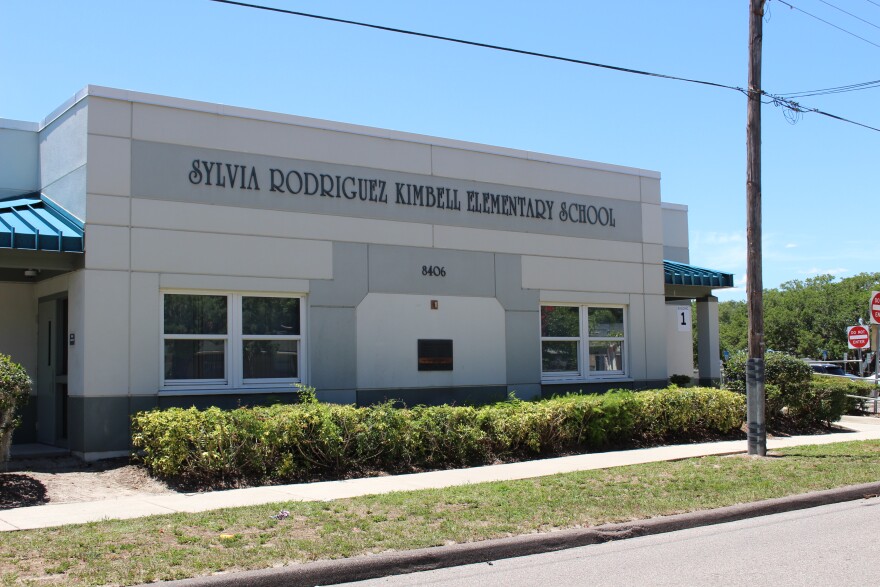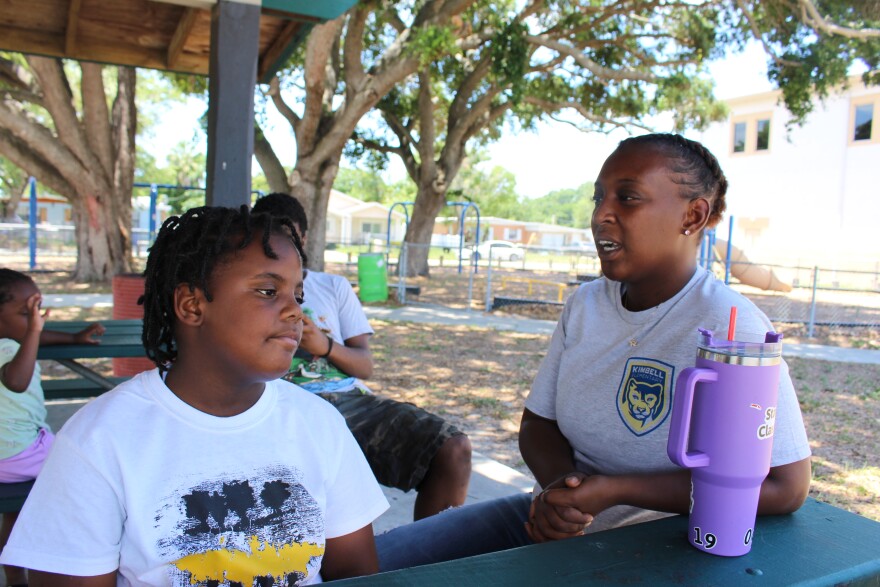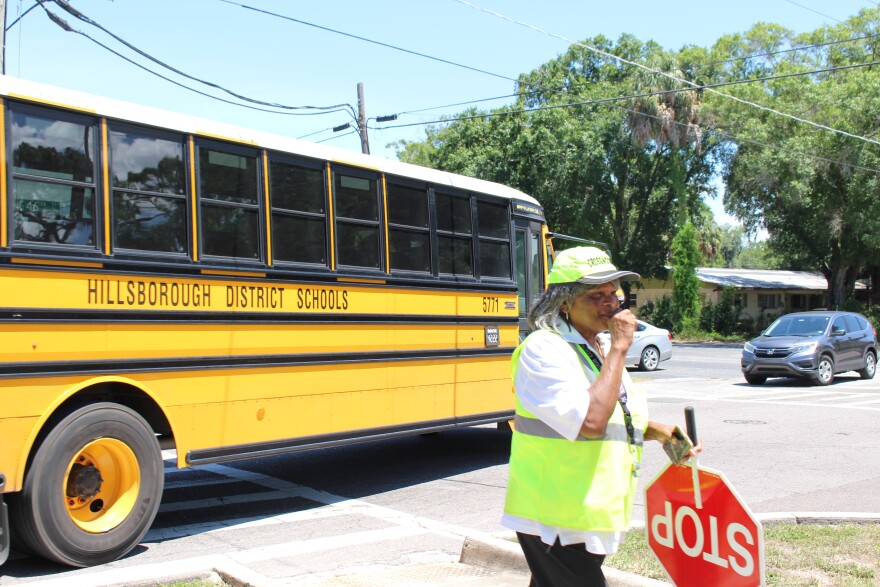For more than half an hour, Rosa Morgan, a crossing guard, stood in the 90 degree heat, waving goodbye to the teachers and students of Kimbell Elementary.
In between farewells, Morgan talked fondly of her memories at the school – how some parents brought her water in the early summer heat and rolled down their windows to shout their hellos and goodbyes. Only one more day remained before the summer break and when Kimbell would close its doors for good.
The school, along with four others – Cleveland Elementary, Adams, McLane and Monroe Middle – were slated for closure at the end of the 2023-24 school year. Enrollment had been falling for years and it didn't make financial sense to keep the buildings open, according to the district. Instead, the more than 2,000 students will transfer to other schools in the fall.
The move is part of a much broader plan that, in addition to closing under enrolled schools, redraws more than a hundred school boundaries, shifting thousands of students into different school zones. Students from over-enrolled schools will move to campuses with more capacity. It’s to offset the imbalance caused partly by population shifts and growing school choice options such as charter, magnet and private schools.
Just Elementary, with less than half of its seats filled, was the first to close last May, angering dozens of parents and community members.
The annual costs saved, the district estimates, is more than $13 million.

Board member Karen Perez, who voted against the plan last May said the disruption to families isn’t worth it.
“We’re moving these children, dramatically, in the middle of their learning and education process,” said Perez, “It’s detrimental, it ends up hurting the future of our children.”
She warned against further exacerbating racial and economic disparities. The closed schools served predominantly Black and Hispanic students and students from economically disadvantaged families. Some of them will have to send their children to a campus miles away from their former neighborhood school.
Then-superintendent Addison Davis had pointed to performance as a factor for closing as well. Speaking about Just, Davis spoke of low literacy and math proficiency rates and how difficult it was to recruit teachers. The plan was to close Just and send kids to higher-performing schools.
"To leave them in a triple-F school knowing what we know and looking at the data, that is heartbreaking to me," board member Stacy Hahn said at the May meeting.
But studies on whether displaced students will actually do better in new schools are mixed. A University of Chicago study on the effects of displaced students showed that students performed better if the receiving school was “dramatically better than the closing schools.”
A community lost
Aurnita Hall watched her three children play on the swingset at Simmon Bowers Park as she described the loss of Kimbell Elementary, where her middle child attended.
The community there was her safety net, she said. Though enrollment had shrunk to 339 students, the tight-knit atmosphere was what made the school unique, said Hall. Teachers and staff were involved in her nine-year-old daughter Calani’s life in and outside of school. When she needed uniforms or hygiene products like shampoo, the school provided care packages.
Hall was involved in a program called “Moms Making Moments” which helped moms like her navigate the school system. It kept her engaged with Calani’s education, she said.
“There was nothing you couldn’t come to them for,” said Hall, “when you have educators that support the community, because they understand what they are surrounded by, it makes a difference.”

After a period of homelessness, Hall and her children found a home in Progress Village, more than 15 miles south of Kimbell. But she continued driving Calani to school, through the 40-minute morning traffic.
“She had to go back to Kimbell,” she said, “I don’t trust anyone else.”
Finding out about the closure was devastating, said Hall. They had “tried to fight it,” but, she said, “I don’t think our voice really counts.” Hall compared the situation to Plant High School – a predominantly white school in South Tampa – where the superintendent changed plans to transfer its students to lower-performing Jefferson High, after receiving pushback from parents.
“They’re going to have the supporters, they’re able to rearrange and rewrite the story,” said Hall, “whereas you have another community that doesn’t really have the resources … we’re used to things being taken from us, so Kimbell is just another thing that got taken.”
Questions about closure
When asked what she would miss most about her school, Calani responded with “science” and “gardening.” A school program called SEEDFOLKids taught Calani and her classmates how to grow various plants. In the program, a lower performing student is paired with a higher-performing student and they would work as a team on activities like measuring stalks.
“It helped kids master things that they should be learning in the classroom and helped the child become more engaged,” said Jeannette Bradley, a founder of the program.
Bradley said the hands-on tasks in the garden and peer-to-peer mentoring lit a spark in students, and, in-turn, gave them the confidence to learn in the classroom. The organization targeted lower-performing schools with the goal of turning things around. But with Kimbell’s closure, the plan is cut short.
“These kids are experiencing a disruption in their education,” said Bradley. “I think it doesn’t bode well for Black communities.”
The closure and reshuffling of families harkens back to when schools were initially integrated, said Bradley. She recalled her own experience as an elementary school student in Progress Village.
“We were the ones being disrupted and bused into white schools,” said Bradley, “Because the Black and brown community does not have, I would say, the economic and voting power, there’s a tendency that they are the ones that are disrupted time and time again.”
Board member Jessica Vaughn, who also voted against the closures, said she wondered if the district did enough to invest in those schools.
“My question is, why is there under enrollment,” asked Vaughn, “Have we looked at boundary changes that would add more kids to those schools? What have we done previously to just identifying and closing these schools?”
Hall said she understands the district’s decision, but pointed out the flaws.
“When you’re looking at numbers, you’re not looking at what the school may mean to a community,” she said, “And that’s not fair, because we’re not numbers.”
Some schools will be repurposed into staff or administrative buildings. The plans for Adams Middle is to relaunch the school as a College Prepatory Academy in two years. Just Elementary School will be rebuilt, along with Stewart Middle school, a $70 million project, according to the district.
Perez said, the neighborhood around the former Just Elementary is changing. She said she doesn’t believe that low-income families will be able to reap the benefits of that new school.
“Once that school is rebuilt,” she said, “the children will not look like the children who used to be there.”




